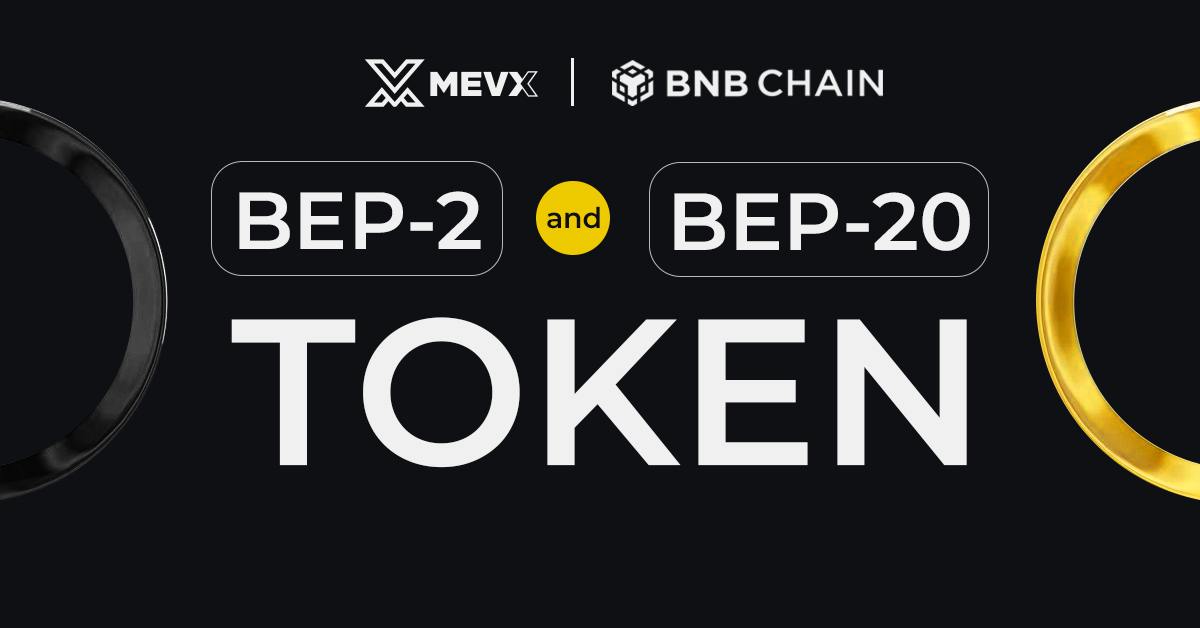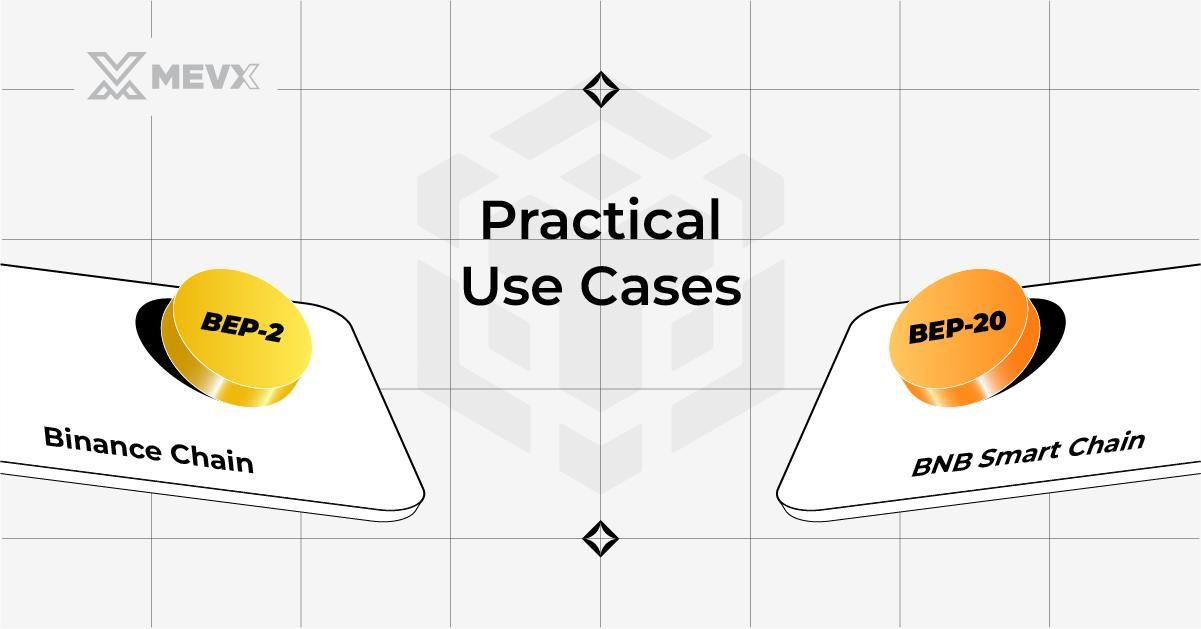Binance’s BNB Chain has evolved into one of the most versatile blockchain environments, with a twin structure comprising the Binance Chain and the BNB Smart Chain, as well as its two most important token standards, namely BEP-2 and BEP-20. Each of these plays a different role in Binance’s ecosystem for serving varied needs at different levels regarding the efficiency of transactions, DeFi, and smart contracts.
In this article, let’s dive into BEP-2 and BEP-20 tokens. We are going to explain what the differences are and give examples of each so that one can keep his head above water in the sea of the BNB Chain.

BNB Chain Token
Why Token Standards Matter on BNB Chain?
With the BNB Chain continuing to extend its use cases beyond simple asset transfers, token standards became of the essence. Token standards, through BEP-2 and BEP-20, give specific ways in which tokens can be created on their respective chains. This assures compatibility and makes it easy for integrations to communicate efficiently. Learning about these standards will enable users to make proper decisions regarding the actions they take within the Binance ecosystem.
What is the BEP-2 Token Standard?
The BEP-2 token standard acts as the foundational standard for tokens on Binance Chain (BC), Binance’s original blockchain. This chain was optimized for fast, low-fee transactions and initially targeted support at Binance DEX (decentralized exchange). In this environment, the BEP-2 tokens are used for basic transfers and trades, having BNB as the main fee token for such transactions.
Key Features of BEP-2
- Fast Transaction Speeds: Binance Chain pays extra attention to transaction efficiency, which is why it best suits trading.
- Low Transaction Fees: Fees on Binance Chain are set as low as possible to support frequent trading and simple transfers.
- Limited Functionality: The BEP-2 tokens are not designed for big and complex applications or smart contracts either.
BEP-2 Token Use Cases
BEP-2 tokens fit best in environments where assets need to fly around, like on Binance DEX. They will be perfect for those kinds of users whose main activity revolves around trading and making transactions within the Binance ecosystem without needing or aiming at using DeFi applications or dApps.
Examples of BEP-2 Tokens
- BNB (BEP-2): This will be used to pay the transaction fee on the Binance Chain. It’s also a main asset deployed on Binance DEX.
- MITH (Mithril): This is a social media and content creation-focused cryptocurrency.
- ANKR (Ankr): This token typically trades on Binance DEX and is designed to be utilized in decentralized cloud computing solutions.
What is the BEP-20 Token Standard?
BEP-20 runs on BNB Smart Chain, also developed by Binance in support of decentralized applications, smart contracts, and other more complex kinds of interactions. BEP-20 was designed to emulate Ethereum’s ERC-20 standard to ease use for Ethereum developers with a similar architecture.
Key Features of BEP-20
- Smart Contract Support: BNB Smart Chain provides all its support for smart contracts, thus making it versatile for dApps, DeFi, and NFTs.
- Interoperability with Ethereum: BEP-20 is allowed to bridge with the Ethereum Network for the facilitation of cross-chain transfer and compatibility.
- Complex Functionality: One can deploy the BEP-20 token for various functions that include staking, governance, DeFi protocols, and NFTs.
BEP-20 Token Use Cases
BEP-20 tokens have wide use in DeFi applications, yield farming, staking, and governance, and also for creating NFTs. Generally, they power the BNB Smart Chain by offering flexibility and functionality to both the developers and the end-users of advanced blockchain solutions.
Examples of BEP-20 Tokens
- BNB (BEP-20): This is used on BNB Smart Chain when paying transaction fees and for governance on some DeFi applications.
- CAKE (PancakeSwap): This is a governance token used in PancakeSwap, one of the biggest decentralized exchanges on BSC.
- BUSD (Binance USD): This is a stablecoin that is pegged to the US dollar and has its use cases in DeFi and trading pairs.
Key Differences Between BEP-2 and BEP-20
BEP-2 and BEP-20 are Binance token standards with distinct purposes. BEP-2 operates on the Binance Chain for fast, low-cost transactions, while BEP-20 on the BNB Smart Chain supports smart contracts and DeFi. The table below highlights key differences:
| Feature | BEP-2 (Binance Chain) | BEP-20 (BNB Smart Chain) |
| Chain | Binance Chain | BNB Smart Chain |
| Functionality | Basic transactions, optimized for speed and low fees | Advanced functionality, supports smart contracts and DeFi |
| Compatibility | Limited to the Binance ecosystem | Compatible with Ethereum and other chains |
| Use Cases | Primarily for trading on Binance DEX | Used in dApps, DeFi, NFTs, staking, and tokenized assets |
| Token Transfer Fees | Paid in BNB on Binance Chain | Paid in BNB on BNB Smart Chain |
Summary of Key Differences: BEP-2 is focused on transactional efficiency and is optimized for exchanges, while BEP-20 enables versatile applications across DeFi, NFTs, and beyond on the BNB Smart Chain.
How to Transfer BEP-2 and BEP-20 Tokens
Binance Wallet and Binance Bridge enable secure transfers between Binance Chain and BNB Smart Chain. Ensure you select the correct network and consider transaction fees to prevent losses.
Binance users often use Binance Wallet to manage both BEP-2 and BEP-20 tokens. Binance Bridge also provides a secure solution for converting tokens between Binance Chain and BNB Smart Chain.
Key Considerations for Transferring Tokens
- Selecting the Correct Network: Ensure you’re using the right token standard (BEP-2 or BEP-20) when transferring to avoid losses. Mistakenly sending BEP-2 tokens to a BEP-20 address can lead to irreversible losses.
- Transaction Fees: Fees for both BEP-2 and BEP-20 transactions are paid in BNB, but fees differ slightly across networks based on activity and congestion.
Practical Use Cases for BEP-2 and BEP-20 Tokens
BEP-2 tokens support trading and quick asset transfers on the Binance Chain, while BEP-20 tokens drive DeFi, NFTs, gaming, and governance on the BNB Smart Chain. This section explores how each token standard powers key applications in the blockchain ecosystem.

Practical Use Cases
BEP-2 Use Cases on Binance Chain
- Trading on Binance DEX: BEP-2 tokens are frequently used as trading pairs.
- Quick Asset Transfers: BEP-2 tokens allow users to transfer assets with minimal delay and low transaction fees.
BEP-20 Use Cases on BNB Smart Chain
- DeFi Applications: The BEP-20 tokens power Defi protocols on the BNB Smart Chain, namely liquidity pools, staking, and yield farming.
- NFTs and Gaming: The BEP – 20 tokens are used pretty often in blockchain gaming and NFT marketplaces, like very popular ones such as PancakeSwap.
- Tokenized Assets and Governance: Thousands of dApps use BEP-20 tokens for governance, with token holders having the right to vote on proposals.
Examples of Projects Leveraging BEP-2 and BEP-20
BEP-2 Projects on Binance Chain
In fact, many projects use BEP-2 tokens to trade on Binance DEX mainly. Binance’s native token BNB, for example, was first issued on Binance Chain as a BEP-2 token and became the foundation for multiple trading pairs.
BEP-20 Projects on BNB Smart Chain
BEP-20 tokens are central to BNB Smart Chain’s DeFi ecosystem:
- PancakeSwap: PancakeSwap (CAKE) is a major DeFi protocol offering token swapping, liquidity pools, and yield farming.
- Venus Protocol: This is the lending market within the BNB Smart Chain, allowing users to borrow and lend various assets in token form through the BEP-20 tokens.
- Marketplaces: Several of the NFT platforms on BNB Smart Chain allow users to create, buy, and sell NFTs with BEP-20 tokens.
Conclusion
The BEP-2 and BEP-20 token standards were designed to meet the unique demands of the Binance ecosystem. While BEP-2 tokens focus on efficient, low-fee transactions, BEP-20 tokens enable a broader range of functionalities, supporting BNB Smart Chain’s expanding DeFi, NFT, and dApp ecosystems.
As Binance continues to innovate, understanding these token standards helps users leverage the right assets and tools for their needs. Choosing between BEP-2 and BEP-20 depends largely on whether you require the speed of Binance Chain or the versatile applications of BNB Smart Chain.
Share on Social Media:
